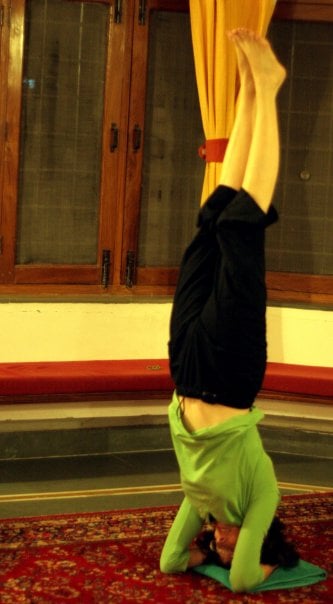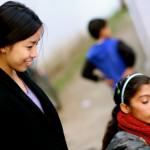Walking out to my own garden to pluck lettuce last night, just before dinner, I stumbled headlong into an open pit, newly excavated to repair some leaking pipes. I had forgotten it was there. I hurt myself quite badly, enough so that Ravi insisted I go to the emergency room to be sure I hadn’t broken a bone.
I had to rest before I was ready for a ride in the car. I was trembling and shaky. There was a blue lump the size of a small egg along my shin bone and there were, truth be told, a few involuntary tears.
Children fall and rise every day, all the time. It’s a non-event. Jump up, brush the dirt off, start again.
For women in their fifties, falling is a MAJOR event, to be re-visited and reviewed many, many times. Seven times. At least.
Because older women are not used to barked shins (the very phrase makes us shudder). We are light years away from bandaids or kisses that take away the sting and we can remember each and every tumble of our middle years. And so we search our falls for meanings and lessons; we ask ourselves questions looking for home truths we can learn from. Like these:
- What if it had been worse? My legs are my ticket to ride. I walk everywhere and I am in constant motion. Six miles a day, minimum, rain or shine. What if I had broken those legs and never recovered my easy stride (because old bones don’t heal so well)?
- What if it had happened to someone else? What if I had asked Vijay or Lakshi to go and pick the lettuce and one of them had fallen into the pit? Then I would have been spared the physical pain but gotten the guilt and anguish instead.
- What if it hadn’t happened at all? What if I hadn’t had that sudden desire for salad; or the hole had been neatly filled and closed; or I had brought a flashlight? There is no end to this train of thought. Inevitably, you start realizing how many things don’t actually happen; how many times you step into traffic and don’t get struck down or bring up a child without a catastrophe or get on a plane and don’t get hijacked. Wislawa Szymborska examines the non-event, the missed encounter, the tragedy averted in her startling, oh-look-again! poem The Railroad Station. Read it and come back. We’ll wait.
- Why is the human body so fragile?, I ask myself now. Why does even a small bang or bump hurt so much? Why does skin take so long to heal? (How do people endure torture? a little voice within me asks, but I push it down.)
- On the other hand, why is the human body so resilient? How is it able to grow a whole new surface and knit its bones back together?
- Why am I so squeamish? How can emergency room doctors stand to look at bloody cuts and gaping wounds, touch them, even? And why does a stranger tending my wound take on such a mythic, larger-than-life role in my world (even if only temporarily)?
- How does one find the precise balance between being brave and uncomplaining while still managing to alert people to how much pain you are in?
Falling down may be a great experience for adults. I’m not sure. For me it was thought provoking and arresting. Many elderly people live in dread of falling. They walk carefully and with full awareness. They use canes and they advance as if moving through a minefield – every step could be fatal, each one could be the last one.
I’m not quite there yet. I still see myself – HAHAHA – as indestructible, walking on water, standing on my head. I know quite well that this only marks me out as deluded, out of touch and living in denial.
I don’t mind. I can still stand on my head. I do still walk six miles a day. And creaky knees and cranky bones notwithstanding, I’m taking up less than my allotted space here on this earth. I think.
But falling is instructive. It’s a reminder of our fragility, our need for humor, connection, surgical tape and cotton gauze. It keeps us humble, surely.
But it also keeps us human. Falling reminds us most concretely of how much we all share, how closely we are all connected in this precarious, dependent, lurching journey.
Even Donald Trump, or Narendra Modi or, or, or . . . whomever you can imagine. This century’s most unrepentant, least aware person is also one of us – Stardust: whirled into human form by some crazy collection of contiguous events, never to be repeated (Thank God).
They too will fall. Pray that their fall gives them insight.





Golden words
falling is instructive. It’s a reminder of our fragility, our need for humor, connection, surgical tape and cotton gauze. It keeps us humble, surely. But it also keeps us human. Falling reminds us most concretely of how much we all share, how closely we are all connected in this precarious, dependent, lurching journey.